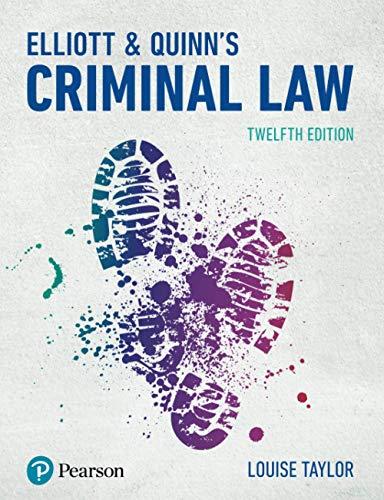Question
The waiters at Jim's restaurant, Gavin and Stuart, have been pestering Jim for weeks about getting an increase in their hourly rate. Jim repeatedly explains
The waiters at Jim's restaurant, Gavin and Stuart, have been pestering Jim for weeks about getting an increase in their hourly rate. Jim repeatedly explains to Gavin and Stuart that he cannot agree to a pay rise without first speaking to his accountant, and that he will not have time to do so until the end of the month. Gavin and Stuart are becoming increasingly frustrated with Jim's refusal to consider their request for a pay rise. One Friday evening, during the busiest part of the shift, Gavin and Stuartconfront Jim and tell him that unless he agrees to increase their hourly rate by $5 per hour, they are going to walk out, leaving him to serve the customers on his own. Jim has no choice but to agree to their request. He promises to adjust their pay as requested.
Is Jim legally obliged to keep his promise? Focus upon whether or not Gavin and Stuart have engaged in duress.
I have a one thousand and two hundred word IRAC to answer this question, i was wondering if you could please give me some help i have read the example on here
(Issue:
The issue is whether Gavin and Stuart have engaged in duress, by making Jim agree to increase their hourly rate after they threatened to walk out of the restaurant during the busiest shift and whether Jim's agreement to adjust their pay is enforceable?
Rule/reasoning:
Under contracts law, duress refers to the act of using threats or psychological pressure to force someone to behave in a way that is contrary to their wishes. In contract law, duress is used as a form of defense to a crime where the defendant uses threats to force the plaintiff to commit a crime that is against their wishes. A party who is forced into an act or contract under duress can rescind the contract, rendering it null and void.
Analysis:
In order to rely on the defense of duress, the party relying on it should be in immediate threat of serious bodily harm or death; the threat made to the victim must be constant. For example, holding a gun to someone's head is considered a qualified threat; and the party believes that the perpetrator of the act will carry out the threat. The fear of the threat is justifiable if a reasonable person would likely experience the same level of fear when faced with the same threat.
In this case, Jim was not in immediate threat of serious bodily harm or death and Gavin and Stuart only threatened to walk out of the restaurant without causing any physical harm to Jim. Gavin and Stuart had constantly requested Jim for a pay increase without using any physical threats.
Conclusion:
Since Gavin and Stuart's demands did not present any threat of serious bodily harm or death on Jim or present any economic duress, then Jim cannot rely on the defense of duress. This means that Jim's agreement to adjust their pay is enforceable as a valid agreement.)
however i was wondering if you could please help me with the rules and analysis i have found an example of the Carlill v Carbolic Smoke Ball Co [1893]
Step by Step Solution
There are 3 Steps involved in it
Step: 1

Get Instant Access to Expert-Tailored Solutions
See step-by-step solutions with expert insights and AI powered tools for academic success
Step: 2

Step: 3

Ace Your Homework with AI
Get the answers you need in no time with our AI-driven, step-by-step assistance
Get Started


